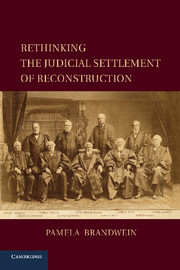Crossref Citations
This Book has been
cited by the following publications. This list is generated based on data provided by Crossref.
Brandwein, Pamela
2011.
Law and American Political Development.
Annual Review of Law and Social Science,
Vol. 7,
Issue. 1,
p.
187.
Kato, Daniel
2012.
STRENGTHENING THE WEAK STATE.
Du Bois Review: Social Science Research on Race,
Vol. 9,
Issue. 2,
p.
457.
Thornhill, Chris
2012.
The formation of a European constitution: an approach from historical-political sociology.
International Journal of Law in Context,
Vol. 8,
Issue. 3,
p.
354.
Bednar, Jenna
Page, Scott E.
and
Toole, Jameson L.
2012.
Revised-Path Dependence.
Political Analysis,
Vol. 20,
Issue. 2,
p.
146.
Hiers, Wesley
2013.
Party Matters.
Social Science History,
Vol. 37,
Issue. 2,
p.
255.
2014.
From Slave Abuse to Hate Crime.
p.
61.
Hoyos, Roman J.
2014.
A Companion to the Reconstruction Presidents 1865–1881.
p.
562.
2015.
A Legal History of the Civil War and Reconstruction.
p.
146.
Tomlins, Christopher
2016.
“Be Operational, or Disappear”: Thoughts on a Present Discontent.
Annual Review of Law and Social Science,
Vol. 12,
Issue. 1,
p.
1.
Elinson, Gregory
2017.
Judicial Partisanship and theSlaughterhouse Cases: Investigating the Relationship Between Courts and Parties.
Studies in American Political Development,
Vol. 31,
Issue. 1,
p.
24.
Johnson, Kimberley S.
2018.
The neo-Redemption Era? APD in the age of #Black lives matter.
Politics, Groups, and Identities,
Vol. 6,
Issue. 1,
p.
120.
2018.
Almost Citizens.
p.
160.
Francis, Megan Ming
2018.
The Strange Fruit of American Political Development.
Politics, Groups, and Identities,
Vol. 6,
Issue. 1,
p.
128.
2018.
Almost Citizens.
p.
162.
2018.
The Cambridge Companion to the United States Constitution.
p.
159.
Beienburg, Sean
2018.
Neither Nullification nor Nationalism: The Battle for the States’ Rights Middle Ground during Prohibition.
American Political Thought,
Vol. 7,
Issue. 2,
p.
271.
Suryanarayan, Pavithra
and
White, Steven
2019.
Slavery, Reconstruction, and Bureaucratic Capacity in the American South.
SSRN Electronic Journal,
Scott, Rebecca J.
2020.
Discerning a Dignitary Offense: The Concept of Equal “Public Rights” during Reconstruction.
Law and History Review,
Vol. 38,
Issue. 3,
p.
519.
Epperly, Brad
Witko, Christopher
Strickler, Ryan
and
White, Paul
2020.
Rule by Violence, Rule by Law: Lynching, Jim Crow, and the Continuing Evolution of Voter Suppression in the U.S..
Perspectives on Politics,
Vol. 18,
Issue. 3,
p.
756.
SURYANARAYAN, PAVITHRA
and
WHITE, STEVEN
2021.
Slavery, Reconstruction, and Bureaucratic Capacity in the American South.
American Political Science Review,
Vol. 115,
Issue. 2,
p.
568.



